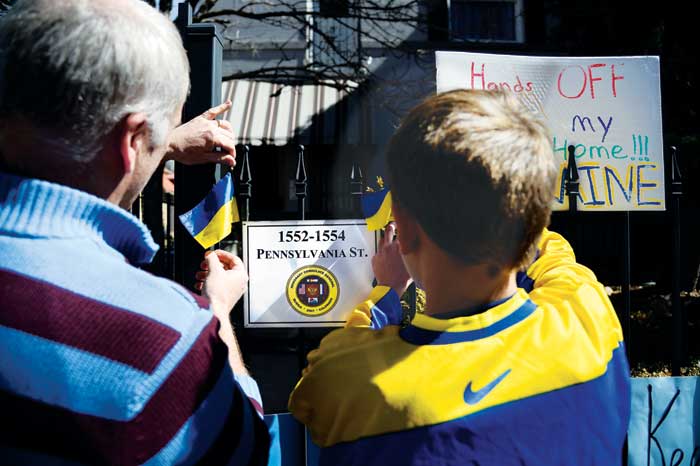
John Babiak and his son Marco put up Ukrainian flags at the Russian consulate. Photo by John Leyba/Denver Post
I have very strong emotions about the events that have transpired in Ukraine during the past six months. As the son of World War II refugees from the former Ukrainian Soviet Socialist Republic, my ties to my family’s home are quite real. My parents fled western Ukraine in 1944 in hopes of moving out from under the repressive rule of the Soviet Union and the Ukraine’s occupation by Nazi Germany. After living in several displaced persons camps throughout Europe, my parents’ dream of living in a democracy became a reality when they were granted permission to immigrate to the United States in 1949.
As a child growing up within a small Ukrainian-American community in upstate New York, my parents and their friends often spoke of their experiences living within the Soviet Union. I often watched my mother and father weep when they recalled memories of their family members and neighbors being arrested—charged with the crime of being a “Ukrainian nationalist,” convicted in mock trials, then executed in public, so as to serve as an example to others who were harboring thoughts or feelings of their Ukrainian nationality. My parents spoke of the meaning of freedom and the value of human rights in ways that no high school history textbook could.
Ukraine and Russia have been intertwined for centuries. In the 9th century, the empire of Kievan Rus grew from the city of Kiev, Ukraine’s modern day capital. Historians claim that Kiev is the birthplace of Ukraine and Russia.
Ukrainians have had little or no independence from Russia prior to 1991 when the Soviet Union dissolved, and Ukraine quickly declared independence. Twice, Ukrainians were forcibly absorbed by the Soviet Union. Central and eastern Ukraine came under its rule in 1919, and the province of Lviv, in western Ukraine—where my family originates—was annexed from Poland in 1939.
Under Joseph Stalin’s regime, an estimated 7 million Ukrainians were intentionally exterminated by hunger during a man-made famine. In 1932, Stalin ordered the famine to punish those who resisted the adoption of Soviet agriculture and collectivization policies. Stalin did not stop there. He Sovietized the Ukraine by installing leadership throughout the republic that was pro-Moscow and anti-Ukrainian. Ukrainian churches closed, the native language purged, and every form of Ukrainian cultural and nationalism suppressed.
Even after Ukraine’s independence and fledging attempt to become a democracy, Russia’s influences have continued. Ramped corruption, fraudulent elections and heavy-handed meddling have impeded Ukraine’s strides to become a democracy. At the same time, a majority of Ukrainians desperately wants to regain their cultural identity and see their country become a productive and respected European nation.
This tug of war finally snapped in November when Ukraine’s president, Viktor Yanukvich, abandoned his promise to sign an agreement of association with the European Union, and instead, signed an agreement to strengthen Ukraine’s relationship with Russia. This infuriated most Ukrainians and the people’s revolution was launched, the result of which we have witnessed in practically every form of modern news media.
I am one with the Ukrainian movement. I wish that once and for all, Ukrainians can stand up on their own two feet and rid themselves from outside influences, corruption, and human rights abuse. I hope that through the will of the Ukrainian people, combined with the support of the each and every democratic nation, Ukraine’s dream of becoming a true democracy, with liberty and justice for all, will become a reality—no different than when America embraced my parents, and gave them freedom, rights and opportunity.


Thank you Mr. Babiak on a well written viewpoint. I would like to add that Ukrainians have always had issues with Russia, especially with respect to gaining greater autonomy from them. Even in ancient historical rivaly, Ukrainians can show a direct link with the legacy of Kievan Rus (or Ruthenian) to its' successor state of Galician-Volhynian Principality, whereas the Moscovia (current day Russians) was not founded until the mid 1400's. And yet, the Russian myth attempts to equate Kievan Rus with current day Russia even though there was not even a hint or allusion toward Kievan legacy for many centuries later. Russian has attempted to absorb ancient Ukrainian history as their own. In doing so, they attempt to justify colonization of Ukrainian lands—then and now.